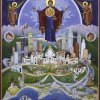Америчка прича о „Несаници” Милене Барили
Ове податке, који до сада нису познати нашој средини, износи Иван Делач, англиста и преводилац из Београда који се након превођења трилогије о Милени Барили, чији је уредник Зорица Стабловић Булајић, у издању куће „Хеспериа еду”, пре неколико година заинтересовао за даље истраживање живота и рада наше сликарке. Делач је преводио књиге за САНУ и Народни музеј, а сада пише сценарио, на енглеском језику, за филм о Милени Барили (Пожаревац, 1909 – Њујорк, 1945).
Истражујући галерије које су постојале четрдесетих година 20. века, у време када је Милена живела у Њујорку, Иван Делач наилази на податак о „Изложби 31 жене”. Ступа у контакт са британском историчарком уметности Су Гилберт која је објавила блог о свакој од учесница изложбе. Она му је послала листу изложених дела, а исти списак Делач је пронашао и у једном документарцу о Пеги Гугенхајм. Потврду о Миленином учешћу на овој изложби нашао је и у раду Кет Бакли, историчарке уметности из Балтимора, а податак стоји и на Википедији на енглеском језику.







 The very successful group of art galleries, under the name of Simic Galleries Inc., is the result of the hopes, dreams and aspirations of a man of great vision, Mario B. Simic.
The very successful group of art galleries, under the name of Simic Galleries Inc., is the result of the hopes, dreams and aspirations of a man of great vision, Mario B. Simic.

